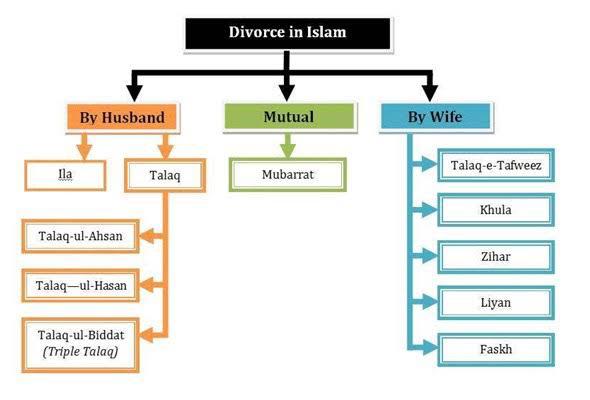 Modes of Dissolution of Marriage under Muslim Law
Modes of Dissolution of Marriage under Muslim Law
Under Muslim law, marriage (Nikah) is considered a civil contract that can be dissolved through various modes. The dissolution of marriage can occur through natural causes, the act of parties, or judicial intervention. This article outlines the key methods recognized under Islamic law and statutory provisions applicable in India.
1. Dissolution by Death
Marriage comes to an automatic end upon the death of the husband or wife.
• If the wife dies, the husband is allowed to remarry immediately.
• If the husband dies, the widow must observe an Iddat period:
• Four months and ten days, or
• Till delivery, if she is pregnant.
2. Dissolution by the Act of Parties
Marriage may also be dissolved by the voluntary acts of the husband, the wife, or both by mutual consent. These include:
A. By the Husband
i. Talaq (Divorce by Husband)
The word Talaq means “to release” or “to untie the knot.” It can be classified into the following types:
a. Talaq-ul-Sunnat (Approved Form)
This is in accordance with the traditions of the Prophet (PBUH) and includes:
• Ahsan (Best form):
• A single pronouncement during a period of purity (Tuhr).
• No sexual intercourse during the Iddat period.
• Becomes irrevocable after the Iddat expires.
• Hasan (Good form):
• Three pronouncements made in three successive periods of purity.
• No intercourse during these intervals.
• Becomes irrevocable after the third pronouncement.
b. Talaq-ul-Biddat (Instant Triple Talaq)
• Involves three pronouncements made at once.
• Considered sinful and disapproved by jurists.
• Not recognized by Shia law.
• Declared unconstitutional by the Supreme Court in Shayara Bano v. Union of India (2017) for violating Article 14 of the Constitution.
ii. Ila (Vow of Continence)
• Husband vows not to have sexual relations for at least four months.
• Marriage dissolves if the vow is not revoked before expiry.
iii. Zihar (Injurious Comparison)
• Husband compares wife with a woman in prohibited relationship (e.g., mother).
• Wife can refuse cohabitation until the husband performs atonement:
• Fasting for two months,
• Feeding 60 poor persons, or
• Freeing a slave.
B. By the Wife
i. Talaq-e-Tafweez (Delegated Divorce)
• Husband may delegate the right to divorce to his wife or a third party.
• Valid if the condition is reasonable and specific, e.g., wife can divorce if husband remarries or is cruel.
C. By Mutual Consent
i. Khula
• Initiated by the wife.
• She offers to return her dower (Mahr) or another consideration.
• If accepted by the husband, the marriage is dissolved irrevocably.
ii. Mubarat
• Initiated mutually by both spouses.
• Once the offer is accepted, divorce becomes irrevocable.
• No consideration is necessary.
✓ In both Khula and Mubarat, the wife must observe the Iddat period. Reconciliation is only possible through fresh marriage.
3. Dissolution by Judicial Process
A. Lian (Mutual Imprecation)
• If the husband falsely accuses his wife of adultery, she can seek judicial divorce.
B. Faskh (Judicial Annulment)
Governed by the Dissolution of Muslim Marriages Act, 1939, especially Section 2, which allows a Muslim wife to obtain divorce on the following grounds:
• Husband’s whereabouts unknown for 4 years.
• No maintenance provided for 2 years.
• Husband sentenced to 7 years or more in prison.
• Failure to perform marital obligations for 3 years.
• Impotency (if not cured within 1 year of court direction).
• Husband is insane for 2 years or has a venereal disease.
• Marriage occurred before age 15 and repudiated before 18 (if unconsummated).
• Husband treats her with cruelty.
• Any other valid ground under Muslim law.
🔹 Section 5 of the Act ensures that dissolution does *not affect the wife’s right to dower (Mahr).
Legal Implications of Divorce under Muslim Law
• Post-divorce, sexual intercourse becomes unlawful; any children from such relation are illegitimate.
• Wife must observe Iddat before remarrying unless the marriage was not consummated.
• Dower (Mahr):
• Full amount if consummated.
• Half, if not consummated.
• Husband must provide maintenance during Iddat.
• Inheritance rights continue until the divorce becomes final and irrevocable.
Important Case Laws
• Shayara Bano v. Union of India (2017)
– Triple Talaq declared unconstitutional.
• Juveria Abdul Majid Patni v. Atif Iqbal Mansoori (2014)
– Khula initiated by wife cannot be refused by the husband, except for reasonable negotiation.
Frequently Asked Questions (FAQs)
Q1. Is Triple Talaq valid under Muslim law in India?
➡️ No. It was declared unconstitutional in Shayara Bano v. Union of India (2017).
Q2. What is the difference between Khula and Mubarat?
➡️ Khula is initiated by the wife with compensation; Mubarat is by mutual consent without necessarily offering consideration.
Q3. Can a Muslim wife divorce her husband without his consent?
➡️ Yes, under Talaq-e-Tafweez or through court under the Dissolution of Muslim Marriages Act, 1939.
Q4. Is Talaq by Zihar still practiced?
➡️ It is rarely practiced and considered outdated but still valid under classical Islamic law.
Start Your Preparation with TOA
At Theory of Abrogation, we equip you with everything you need:
•Subject-wise expert classes
•Mock test series
•Legal current affairs
•Personalized mentorship for interview preparation
“Your law degree is your foundation, but your preparation is what will build your success.”
Join Our New Batch Now!
Prepare smart. Prepare with Theory of Abrogation.
Contact Us:
📍 B-109, Commercial
Complex Dr. Mukherjee
Nagar, Delhi-09
📞 +91 9971399324 | +91 8840961324
📧[email protected]
